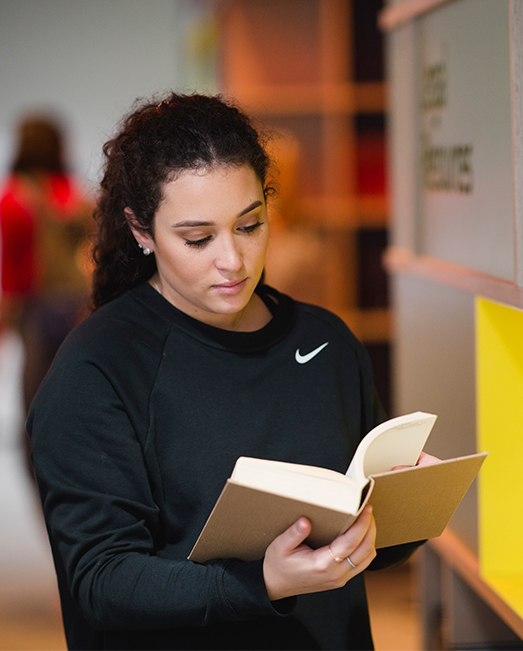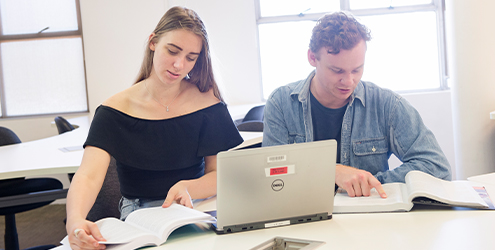Study
Copyright@ Australian Catholic University 1998-2026 | ABN 15 050 192 660 CRICOS registered provider: 00004G | PRV12008
Copyright@ Australian Catholic University 1998-2026 | ABN 15 050 192 660 CRICOS registered provider: 00004G | PRV12008

Ever had that feeling that your brain is full? That you couldn’t possibly remember another thing? Impact talked to Dr Amina Youssef-Shalala to find out how to make the most of our memory.
It’s exam time and you’ve been studying for hours on end. But no matter how hard you try you feel like a computer with a full hard drive – your memory is at capacity and no new information seems to fit.
But all is not lost according to Dr Youssef-Shala, an education lecturer at ACU.
“We have three main types of memory structures: sensory, working and long-term memory,” said Dr Youssef-Shala. “When we’re paying attention to learning material, the information goes to your working memory. This is where conscious processing takes place. The problem is that working memory is limited, and after long periods of study you can suffer from cognitive overload. And this is why your brain may feel full.”
So, how do you overcome information overload? The trick is to get information from your working and sensory memories into your long-term memory for storage.
“Long-term memory has infinite storage capacity. This is where you want to keep all that important information you need to remember.”
Sensory memory, which relies on sight, hearing, small, taste and touch, are often underutilised.
When we activate this memory structure, we are engaging in the processes of attention and perception. This can be as simple as studying in a quiet room so our cognitive resources are focused on the task at hand. It also replicates the quiet environment of an exam room, the very place you’ll need to retrieve this information.
To engage other senses try learning using podcasts or visual aids such as posters. Even talking to a friend or family about what you’re learning can help.

When you’re trying to learn difficult concepts, don’t dive into the deep end. Instead, take a stepped approach to learning – starting with the simple concepts and working your way up to more complex information.
“Think of what you’re learning as ‘bits’. Do you need to master one topic before you can move on to more challenging parts? If it is a ‘yes’ to these questions then you are undoubtedly using up lots of ‘bits’ of your limited working memory,” said Dr Youssef-Shalala.
The key is to master the smaller bits first, putting them into your long-term memory so you can recall that information without effort. This then frees up space in your working memory to tacking the more complex information – the next round of bits.
“It’s a technique called automation, where we learn something to the point it becomes an automatic thought or process. Once we master a bit, it goes into the long-term memory and we can allocate more cognitive resources to harder tasks that use more bits. It’s why we’re encouraged to learn our multiplication tables off by heart in school.”
Another method is the Pomodoro technique, which aims to improve productivity by working through tasks in short stints.
“Use a timer to break down study into 25-minute intervals, having a short break in between. If done properly you’ll find this technique will increase your focus, reduce anxiety and boost your motivation.”
When it comes to revision, most of us will be familiar with the incessant writing, reading and rewriting of our notes. This type of rote learning may help you remember in the short-term, but when it comes to an exam it can make it harder to retrieve the right information.
“Try linking the new information your revising to old information that’s already stored in your long-term memory. Draw an analogy between the two. Then instead of just writing it all out, find a friend or family member and explain it to them, try to teach them about it. If you can do that, then it means you have a deeper understanding of the topic and the information is likely stored in your long-term memory.”
Our attention spans are challenged more than ever, with a constant stream of distractions literally at our fingertips. So it's important to train yourself to stay focused.
Social media and digital tools encourage our brain to constantly switch attention. While this can be useful in some circumstances, it’s also important to exercise our brain to pay attention. Mindfulness practices are one way we can do this and have been shown to enhance our memory making abilities.
“By understanding how our memory works, we can find the methods of study that put it to best use. There are many different ways to learn and retain information, without ‘crowding’ your brain.”
Dreaming of life after exams? Find out more about studying at ACU.
Copyright@ Australian Catholic University 1998-2026 | ABN 15 050 192 660 CRICOS registered provider: 00004G | PRV12008